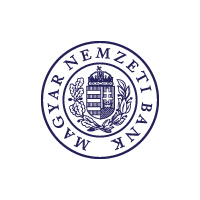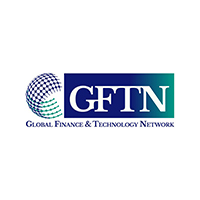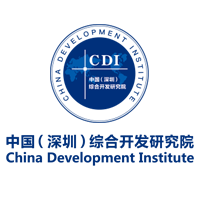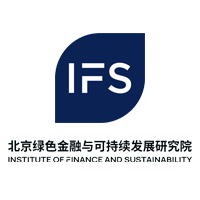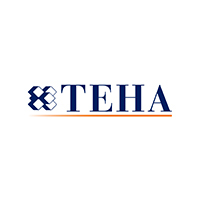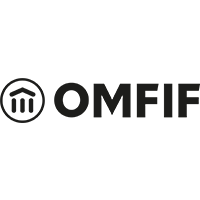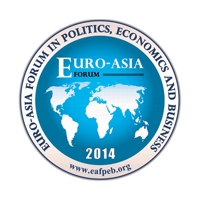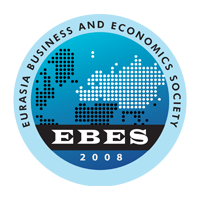Eurasia
nyomtatásWelcoming remarks by Governor György H Matolcsy
This year the Budapest Eurasia Forum will return for celebrating not only the fifth edition of this unique event series, but the 100th anniversary of the establishment of the Magyar Nemzeti Bank, the central bank of Hungary. The world has changed significantly since Sándor Popovics, the first governor of the Magyar Nemzeti Bank took office in 1924 and we, central bankers did our best to keep up with the change. However, while our responsibilities and mandates have been augmented, our fundamental objective has not changed and hundred years past the Magyar Nemzeti Bank still stands to serve the betterment of our nation.
The events of recent years starting from climate change, financial crises, a global pandemic and increasing geopolitical tensions taught us that the most pressing issues of our times are intrinsically global and can only be solved by “joint thinking” and international cooperation. The Magyar Nemzeti Bank as one of the leading proponents of enhancing Eurasian cooperation, actively promotes international conversation and the sharing of best practices in relation to the constantly expanding mandate and role of central banks. As part of this effort, the Budapest Eurasia event series were born in 2019 and we are pleased to observe that it is reaching more and more people every year as a consequence of our efforts and adaptability.
The title of this year’s Forum “Keywords of success: talent, knowledge, technology and capital” reflects well on the changes which have occurred in our economies in the past hundred years, while also shows the path to the future. A century ago, capital was considered one of the most, if not the most important driver of economic growth. While still a major factor in our technologically advanced global society, talent and knowledge are taking the lead as the most important factors of economic success. Count István Széchenyi, one of the greatest statesman and reformer in Hungarian history has already recognized it in the 19th century as he wrote in 1830: the strength of a nation lies in the multitude of educated people. Indeed, talent is getting more and more important, and I am proud to say, Hungary has proven to be at the forefront of this trend. In 2023 we could celebrate two new Hungarian Nobel laureates, Katalin Karikó and Ferenc Krausz, whose achievements further showcased that Hungarian talent and knowledge are well connected to innovations.
Today, the most successful countries are those, who can build an advantageous mix of knowledge, technology and capital driven by talent, for which a supportive education system is a must. As Professor Eng Chye Tan, president of the National University of Singapore said at the Eurasia Forum in 2022: I see universities as talent generators, we produce the talents for the economy.
This year, our distinguished speakers will focus on the issue of what inescapable adjustments are required to achieve sustainable growth and prosperity in a talent based, technologically advanced global society. The Budapest Eurasia Forum 2024 will explore the ways to make the interconnected global financial system more reliable and effective, the changing global world order, the future of geopolitics, and the impact of technological breakthroughs. Furthermore, our speakers will assess the necessary reforms of multilateral organisations, the importance of well-being and prosperity in evaluating economic success, and the role of cooperation between the academic and entrepreneurial worlds in cultivating talents for the future. All of these subjects will undoubtedly be investigated with the core issues of sustainability, prosperity, digitalisation, and green transition in mind.
Innovative minds may wonder what will happen in the next hundred years. From my perspective, the answer lies with the global cooperation and the talents we build today. An essential requirement for this is that the discourse be built on inclusivity and knowledge sharing. According to a Chinese proverb: “If you want one year of prosperity, grow grain. If you want 10 years of prosperity, grow trees. If you want 100 years of prosperity, grow people.” Accordingly, the Forum’s main objective is to reach professionals all around the world and integrate them into global discourse in order to lay the groundwork for a sustainable and prosperous future.
I wish everyone stimulating conversations and sincerely hope that the event will continue to have a positive social impact in addition to influencing official channels.
György H MATOLCSY
PROGRAMME
Conference venue: MNB HQ, 1013 Budapest, I. district, Krisztina körút 55. (Hungary)
Thursday, 21 November 2024
08:00-09:00
Registration
09:00-09:45
High-level opening ceremony
- György H MATOLCSY, Governor, Magyar Nemzeti Bank (MNB)
- Viktor ORBÁN, Prime Minister of Hungary
09:45-10:00
Coffee break
10:00-10:45
High-level keynote speeches
- Ludger SCHUKNECHT, Vice President and Corporate Secretary, Asian Infrastructure Investment Bank (AIIB)
- Zongyi ZHANG, President, Xiamen University
- Madina ABYLKASSYMOVA, Chair, Agency of the Republic of Kazakhstan for the Regulation and Development of the Financial Market
- Hongyan LI, Deputy Administrator, State Administration of Foreign Exchange (SAFE), China
10:45-11:00
Coffee break
PANEL 1. FINANCE: The financial system of tomorrow – geopolitics, digitalization and cooperation in the 21st century
PANEL 1. FINANCE: The financial system of tomorrow – geopolitics, digitalization and cooperation in the 21st century
The global financial system is in the midst of vast/deep transformation. Digital transactions are taking the center stage, new, unprecedented players are entering the market, central banks are taking up novel roles, while the financial system is becoming increasingly interconnected through the linkages of instant payment systems and CBDC schemes. With financial technology surging, sustainable efforts increasing and geopolitics getting heated people cannot help but wonder what lies ahead for the global financial system. The panel will discuss what form financial services and the financial system can take in the future, and what we can do to build a financial system for the future.
11:00-11:25
Fireside chat
- Ronit GHOSE, Managing Director and Global Head, Future of Finance, Citi Research
- Sopnendu MOHANTY, Chief Fintech Officer, Monetary Authority of Singapore
Moderator:
- Lajos BARTHA, Executive Director, MNB
11:25-12:25
Panel discussion
- Jochen BIEDERMANN, Managing Director, World Alliance of International Financial Centers
- Varun MITTAL, Head of Innovation & Ecosystem, Singlife and Founder, Fintech Nation and Co-Founder, Singapore FinTech Association
- Shi PIAO, Executive Director, Digital Economy and Green Innovation Research Center, Ant Group Research Institute
Moderator:
- Ádám BANAI, Executive Director, MNB
12:25-14:00
Lunch break
13:15-13:50
Optional Programme
Guided Art Tour through the MNB Headquarters led by Ms. Kinga Hamvai, Head of the MNB Arts and Culture Division
PANEL 2. TECHNOLOGY: What can fuel the future? A navigation to the next decades
PANEL 2. TECHNOLOGY: What can fuel the future? A navigation to the next decades
How can we, as ecosystems, better encourage the translation of deeptech solutions into impactful outcomes? Many of the pressing challenges we face today, from climate change to competitiveness and aging populations, mainly require deeptech and also the new technological tools (such as AI, the metaverse, and new energy sources) to find solutions. In terms of adaptation and implementation, the fuel of the future is one of the most crucial questions that we face today. Will there be a new technological breakthrough that can have the same impact as the internet, digitalization, or metaverse, and if yes, what could it be, and could we implement it in the short run?
14:00-14:25
Fireside chat
- Hui ZHANG, Vice President, NIO Europe
Moderator:
- Zoltán CSÉFALVAY, Head of Centre for Next Technological Futures, School of Economics, Mathias Corvinus Collegium
14:25-15:25
Panel discussion
- Fabienne GOUX-BAUDIMENT, CEO, proGective and Associate, Yonders
- Lorenzo TAVAZZI, Senior Partner, Head of Global Intelligence and Scenarios & Head of International Development, TEHA Group
- Mingjie MA, Director General, DRC Research Department of Innovation Development
Moderator:
- Péter FÁYKISS, International Business Development Director, Hold Asset Management
15:25-15:40
Coffee break
PANEL 3. GEOPOLITICS: The future of geopolitics, the geopolitics of the future
PANEL 3. GEOPOLITICS: The future of geopolitics, the geopolitics of the future
The world is undergoing radical changes, with economic and political power transitions. The newly emerging power hubs reshape the global order, and parallelly, with the technical achievements of Industrial Revolution 5.0 the nature of conflicts is transitioning towards sphere of influences, resources and supplies. Communication is key in boosting productivity and problem-solving, while it contributes to our future through logical decision making. How the dialogue of G2 could de-escalate or even prevent these conflicts while supporting the transition to sustainability? Are there other peace mediation options? The Geopolitics panel discussion aims to analyse the most definitive factors of the future through the lenses of geopolitics.
15:40-16:05
Fireside chat
- C. Gülşen KARANIS EKŞIOĞLU, Ambassador of the Republic of Türkiye, Turkish Embassy in Budapest, Co-Coordinator of Antalya Diplomacy Forum
- Huiyao WANG, Founder and President, Center for China and Globalization (CCG)
Moderator:
- Norbert CSIZMADIA, President of the Board of Trustees, PADME
16:05-17:05
Panel discussion
- Ralf EMMERS, Professor in International Politics of East Asia and Co-Chair of the Centre for International Studies and Diplomacy (CISD), University of London
- Sukhee HAN, President, Institute for National Security Strategy (INSS)
- Qingguo JIA, Director, Institute for Global Cooperation and Understanding (iGCU) and former Dean, School of International Studies, Peking University
Moderator:
- Tamás BARANYI, Director for Strategy, Hungarian Institute of International Affairs
17:05-17:20
Eurasianomics - Sustainable and Innovative Economic Policy Strategies in Eurasia, edited by Barnabás Virág, Deputy Governor of the MNB and Marcell Horváth, Executive Director at the MNB
Ceremonial book launch by Barnabás VIRÁG, Deputy Governor, MNB
Friday, 22 November 2024
08:30-09:00
Registration
09:00-09:30
Keynote conversation
- Michael SYN, President, Singapore Exchange
Moderator:
- Richárd VÉGH, CEO, Budapest Stock Exchange
PANEL 4. ECONOMY: Sustainable prosperity: Unveiling the pillars of economic success
PANEL 4. ECONOMY: Sustainable prosperity: Unveiling the pillars of economic success
The panel reconsiders economic success by focusing on sustainable growth over traditional GDP metrics. Experts will discuss crafting an effective economic policy mix, identifying the foundational elements for a thriving economic strategy, emphasizing well-being and prosperity as crucial indicators. The panel explores the integration of knowledge-based economies for sustainability and how knowledge became an essential tool for fostering sustainable economic growth. The panel addresses reforming capitalism for a more sustainable redistribution of goods, challenging traditional growth paradigms for a new economic future.
09:30-09:55
Fireside chat
- Jae Won LEE, Chief Economist and Deputy Governor, Economic Research Institute, Bank of Korea
Moderator:
- Barnabás VIRÁG, Deputy Governor, MNB
09:55-10:55
Panel discussion
- Akylzhan BAIMAGAMBETOV, Deputy Governor, National Bank of Kazakhstan
- Fabrice MURTIN, Head of Research, OECD Center on Well-being, Inclusion, Sustainability and Equal Opportunities
- Danny QUAH, Li Ka Shing Professor in Economics and Dean, Lee Kuan Yew School of Public Policy, National University of Singapore (NUS)
- Yao WANG, Director General, International Institute of Green Finance and Deputy Secretary General, Green Finance Committee (GFC) of China Society for Finance and Banking
Moderator:
- Zsolt KUTI, Executive Director, MNB
10:55-11:15
Coffee break
PANEL 5. MULTILATERAL COOPERATION: Adapting to Change: The Next Chapter of Multilateralism in an Ever Changing World
PANEL 5. MULTILATERAL COOPERATION: Adapting to Change: The Next Chapter of Multilateralism in an Ever Changing World
The panel aims to dissect the multifaceted dimensions of challenges facing global governance and the imperative for renewal in the face of a new world order. It will discuss strategies in enhancing the adaptability of multilateral frameworks to effectively address evolving geopolitical, economic, climate and technological changes. Experts will unpack the crises faced by international organisations, delve into the complexities of shifting power dynamics, the inclusion imperative, will make assessments on sustainable global governance and by doing so, will illuminate pathways in shaping the future of a resilient multilateral landscape.
11:15-11:40
Fireside chat
- Walter L. CHRISTMAN, Chairman and Founding Director, Global Challenges Forum Foundation
Moderator:
- Márton UGRÓSDY, Deputy State Secretary, Head of the Office of the Prime Minister’s Political Director, Cabinet Office of the Prime Minister of Hungary
11:40-12:40
Panel discussion
- Levente HORVÁTH, Director of Eurasia Center, John von Neumann University
- Nurkhat KUSHIMOV, Advisor of Executive Office, Astana International Financial Centre
- Yongwook RYU, Assistant Professor, Lee Kuan Yew School of Public Policy, National University of Singapore
- Dan WANG, Executive Vice President, Silk Road Fund
Moderator:
- Elena ROVENSKAYA, Program Director, International Institute for Applied Systems Analysis (IIASA)
12:40-14:00
Lunch break
13:00-13:50
Optional Programme
Screening of the MNB movie entitled “The Foundation”
PANEL 6. EDUCATION: The Talent Imperative: Bridging Knowledge, Technology and Entrepreneurship
PANEL 6. EDUCATION: The Talent Imperative: Bridging Knowledge, Technology and Entrepreneurship
The panel uniquely brings together luminaries from leading Eurasian universities, startup incubators, and innovation hubs, showcasing their exemplary practices in nurturing and developing talent for a technology-centric world. How are these institutions dedicating themselves to enhancing competitiveness and fostering innovation? The panel would explore the world of university startup projects and innovation hubs, understanding their pivotal role in talent development and discover how academic and entrepreneurial worlds intertwine to cultivate the next generation of leaders and innovators.
14:00-14:25
Fireside chat
- Jie JIAO, Dean and Chair, Professor of Management, PBC School of Finance, Tsinghua University
Moderator:
- András BALATONI, Director, MNB
14:25-15:25
Panel discussion
- Andris BAUMANIS, CEO & Member of the Board, UniLab
- Bruno LANVIN, President, Smart City Observatory
- David TOH, Chief Executive Officer, NTUitive
- Ji ZHANG, Vice Dean, School of International Relations and Public Affairs, Fudan University
Moderator:
- László SZABÓ, Founder and Head, Hungarian Innovation Hub
15:25-15:45
Coffee break
15:45-16:05
Keynote conversation
- Hans Joachim SCHELLNHUBER, Director General, International Institute for Applied Systems Analysis (IIASA)
Moderator:
- Csaba KANDRÁCS, Deputy Governor, MNB
16:05-16:20
Closing remarks
- Barnabás VIRÁG, Deputy Governor, MNB
Speakers
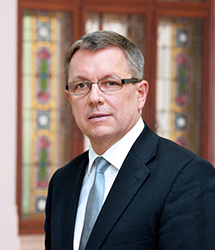
György H MATOLCSY
Governor
Magyar Nemzeti Bank
György H MATOLCSY
Governor
Magyar Nemzeti Bank
Dr György Matolcsy is serving his second term as the governor of Magyar Nemzeti Bank, the central bank of Hungary. He was nominated to the position in 2013 and his tenure was renewed in 2019 for another 6 years. Since 2013 he is also a member of the Fiscal Council. Prior to his current position he was minister of national economy from 2010 to 2013. In 2007 he founded the Hungarian Economic Development Institute, which he headed for 3 years. Between 2000-2002 he was Hungary’s minister of economic affairs. Mr. Matolcsy is the author of the Széchenyi Plan, a comprehensive strategy aiming to promote economic growth in Hungary. He was director of the Institute for Growth (2002-2010) and its predecessor organisation, the Privatisation Research Institute from 1995 to 2000. Since the end of 1998 he has been a member of the economic advisory body of Prime Minister Viktor Orbán. Starting in 1991 he spent 3 years as a member of the Board of Governors at the European Bank for Reconstruction and Development (EBRD) representing the Hungarian Government. In 1990 he joined the Office of the Prime Minister and served as the personal economic advisor to Prime Minister József Antall. Acknowledging his efforts in promoting economic development in Hungary, he was awarded the Barankovics Commemorative Coin in 2013. He graduated at Karl Marx University of Economics in 1977 and obtained his Doctorate degree in 1984.
Mr. Matolcsy is actively involved in educational activities. He is a frequent lecturer at top foreign and Hungarian universities. Since 2024, Mr. Matolcsy has been an honorary professor at Fudan University and John von Neumann University and an honorary citizen of the Budapest University of Technology and Economics. In previous years, he has also received multiple distinctions, including honorary doctorates from the University of Debrecen and the University of Kaposvár, honorary membership of the Fudan Development Institute (FDDI) at Fudan University, and honorary membership on FDDI International Advisory Board of the Shanghai Forum.
Mr. Matolcsy is the author of numerous publications, articles, and books. His most recent publications include Hungarian Vision and Strategy, 2030/40 (2024) (Magyar jövőkép és stratégia, 2010-2030; 2023); Olvasó-Napló I.-II. (2023); Sustainable GDP - Global Discussion Paper (2024) published by the MNB; New Sustainable Economics – Global discussion paper (2022) published by the MNB, and the book titled On the Edge of Times (Az idő mintázatai; 2022) which collects his short thoughts written between 2019 and 2022 as feedbacks for articles of remarkable Western thinkers and journalists. His other books include Economic Balance and Growth (Egyensúly és Növekedés), for which the second edition was published in 2021 (first edition in 2015), The American Empire VS. The European Dream - The Failure of the Euro (Amerikai Birodalom vs. Európai Álom – Az euró kudarca; 2019), Bringing Up the Rear (Éllovasból sereghajtó; 2008), American Empire (Amerikai birodalom; 2004), and Our Living Memories (Élő emlékeink; 2003).

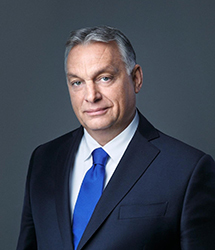
Viktor ORBÁN
Prime Minister of Hungary
Viktor ORBÁN
Prime Minister of Hungary

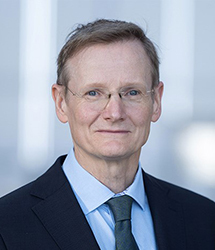
Ludger SCHUKNECHT
Vice President and Corporate Secretary
Asian Infrastructure Investment Bank (AIIB)
Ludger SCHUKNECHT
Vice President and Corporate Secretary
Asian Infrastructure Investment Bank (AIIB)
Ludger Schuknecht is Vice President and Corporate Secretary. He is responsible for AIIB’s relations with its Members, the Board of Governors, the Board of Directors, other aspects of governance including the admission of new Members and the integrity of the Bank’s governance. He also oversees how the Bank communicates with key external stakeholders and has supervision over its awareness-building and brand and reputation management efforts to promote understanding of the Bank’s operations and mission among internal and external audiences.
Before joining AIIB in August 2021, he held important leadership posts at the national and international levels. Most recently, he was a Visiting Professor at the Lee Kuan Yew School of Public Policy, Singapore. Prior to this role, he was Deputy Secretary-General at the Organization for Economic Co-operation and Development (OECD) and was previously Chief Economist and Director General of Germany’s Federal Finance Ministry. In this position, he served as the G20 Finance Deputy for Germany and Co-chair of the Infrastructure Investment Working Group of the G20. Schuknecht has extensive experience working with international financial institutions, including the International Monetary Fund (IMF), the European Central Bank and the World Trade Organization. He also acted as the Chief Negotiator for Germany in the founding of AIIB, making him one of the architects of AIIB and one of the drafters of its Articles of Agreement.
He holds a Vordiplom in Economics from Ludwig Maximilian University of Munich, Germany; an MA in Economics from George Mason University, USA; and a Ph.D in Economics and a Habilitation in Economics from Universität Konstanz, Germany. Schuknecht is from Germany.

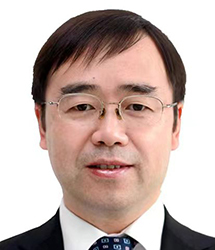
Zongyi ZHANG
President
Xiamen University
Zongyi ZHANG
President
Xiamen University
Professor Zhang Zongyi is the President of Xiamen University.
He is a recipient of the National Science Fund for Distinguished Young Scholars and China Youth Science and Technology Award. He has been selected for several talents programmes, including, Leading Talents in Philosophy and Social Sciences under the National Ten Thousand Talents Programme, National High-level Talents Programme, New Century Excellent Talents in University Programme by the Ministry of Education, Four Batches Talents Programme by the Publicity Department of the CPC, and Excellent Young Teachers Programme by the Ministry of Education. He is also a Member of the Academic Degrees Committee of the State Council, a Convenor of the Discipline Appraisal Group for Business Administration of the State Council, a Member of China National MBA Education Supervisory Committee, and the Vice Chairman of the National Advisory Committee on Teaching Economics under the Ministry of Education. His research interests include transition economy and its growth, technological innovation and management, financial risk management, energy economics, and management.

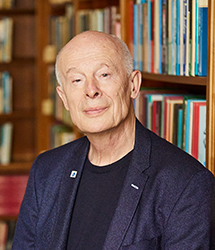
Hans Joachim SCHELLNHUBER
Director General
International Institute for Applied Systems Analysis (IIASA)
Hans Joachim SCHELLNHUBER
Director General
International Institute for Applied Systems Analysis (IIASA)
Hans Joachim ('John') Schellnhuber currently serves as the twelfth IIASA Director General. Prior to joining IIASA he led the Potsdam Institute for Climate Impact Research (PIK) from 1992 to 2018 as their founding director. He also served as research director of the Tyndall Centre for Climate Change Research in Great Britain from 2001 to 2005.
Since 2019, Schellnhuber has been focusing his scientific work and communication skills on the transformation of the built environment, with a specific emphasis on the climate restoration potential of regenerative architecture. In this context, he established Bauhaus Earth as a not-for-profit company and became a member of the High-Level Roundtable of the New European Bauhaus initiative. In addition, he acted as a scientific advisor to a number of eminent public and religious leaders, institutions and government bodies and contributed in various ways to the Intergovernmental Panel on Climate Change (IPCC), which was awarded the Nobel Peace Prize in 2007.
Schellnhuber studied physics and mathematics at the University of Regensburg, where he also completed his doctorate in quantum physics. Following a postdoctoral position at the Institute for Theoretical Physics, Santa Barbara, he held full professorships at the Universities of Oldenburg and Potsdam, as well as at the University of East Anglia in Norwich. He has published some 300 scientific articles and books and is listed as a Highly Cited Researcher (Cross Field) by Clarivate.

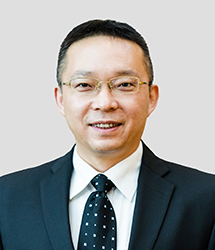
Jie JIAO
Dean and Chair Professor of Management
PBC School of Finance Tsinghua University
Jie JIAO
Dean and Chair Professor of Management
PBC School of Finance Tsinghua University
Professor JIAO Jie is Chief Financial Officer at Tsinghua University, and dean, chair professor and doctoral supervisor at Tsinghua University PBC School of Finance. He studied at Tsinghua University School of Economic and Management for bachelor and master's degrees, and obtained his doctoral degree at George Washington University.
His main research fields include: strategic planning and investment, management innovation, state-owned asset management, industrial and regional development strategies.
Professor Jiao is also dean of Tsinghua University Institute for State-owned Assets Management, director of Research Center for China's Industrial Development at School of Economics and Management, chief economist and honorary chief editor of State Assets Management. He is Fellow of Chartered Global Management Accountant (CIMA), and holds the professional competence of Chartered Institute of Management Accountants (CGMA) and Chinese Senior Management Accountant. He has been in charge of or participated in many research projects including projects sponsored by National Natural Science Foundation of China.
Professor Jiao has published over 50 research papers on top journals in the world and in China, as well as 16 business cases, and important policy research reports. He has won Excellent Teaching Award at Tsinghua University and First Prize in Teaching at Tsinghua University School of Economics and Management. His research was awarded Second Prize for Excellent Scientific Research Achievements in Higher Education by the Ministry of Education, and First Prize of Beijing Philosophy and Social Science Achievements.

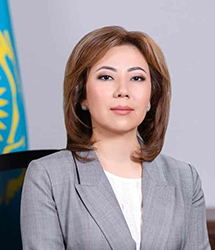
Madina ABYLKASSYMOVA
Chairperson
Agency of the Republic of Kazakhstan for Regulation and Development of the Financial Market
Madina ABYLKASSYMOVA
Chairperson
Agency of the Republic of Kazakhstan for Regulation and Development of the Financial Market
Madina Abylkassymova is the Chairperson of the Agency for Regulation and Development of Financial Market. She took office as the Chair of the newly established financial regulatory authority of Kazakhstan in January, 2020.
Prior to her current appointment, Ms. Abylkassymova was a Deputy Governor of the National Bank of Kazakhstan. In this capacity she oversaw monetary policy, financial stability, financial market statistics, balance of payments and international cooperation issues.
Ms. Abylkassymova has more than 20 years of experience in public service with a focus on strategic economic development issues and international economic relations. She held various leading positions within the Ministry of National Economy, Ministry of Economic Development and Trade, Centre for Strategic Development and Analysis at the President’s Administration, Prime Minister's Office.
Madina Abylkassymova is a graduate from the Kazakh State Academy of Management. She holds Master’s degree of Economics Management from Columbia University and Master’s degree of Public Administration from Harvard University’s John F. Kennedy School of Government.

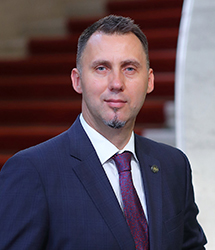
Barnabás VIRÁG
Deputy Governor
Magyar Nemzeti Bank
Barnabás VIRÁG
Deputy Governor
Magyar Nemzeti Bank
Barnabás Virág has been Deputy Governor of the Magyar Nemzeti Bank since 22 June 2020
Deputy Governor of the Magyar Nemzeti Bank responsible for monetary policy, financial stability, and international relations. From 2015 until his appointment as Deputy Governor he served as Executive Director of the MNB responsible for monetary policy and economic analysis. Between 2013 and 2015 he was Director of the MNB responsible for economic analysis. From 2003 he worked as an Analyst at the MNB. Prior to that he taught at the Budapest University of Economics and State Administration (today Budapest Corvinus University) and was an Analyst at the Ministry of Finance.
In 2017 he was awarded the Popovics Prize. He completed his studies at the Budapest University of Economics and State Administration

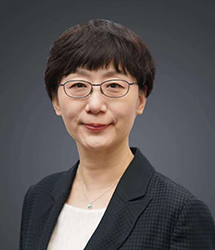
Hongyan LI
Deputy Administrator
State Administration of Foreign Exchange (SAFE), China
Hongyan LI
Deputy Administrator
State Administration of Foreign Exchange (SAFE), China
Ms Hongyan Li born in January 1972. She is a Member of the CPC State Administration of Foreign Exchange (SAFE) Leadership Group, and she is the Deputy Administrator of the SAFE. She holds Master of Science and Master of Public Administration degrees.

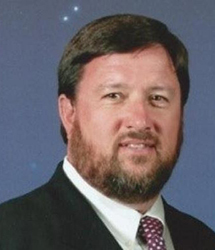
Walter L. CHRISTMAN
Chairman and Founding Director
Global Challenges Forum Foundation
Walter L. CHRISTMAN
Chairman and Founding Director
Global Challenges Forum Foundation
Dr. Walter L. Christman is a globally acclaimed advocate for fostering next-generation resilience through innovative international partnerships. As Chairman of the Global Challenges Forum Foundation in Geneva, he shapes global resilience strategies and publishes through Global Resilience Publishing in Cambridge, UK. He authored the forthcoming book, "Building Global Resilience: A Call to Action." Dr. Christman is a Distinguished Senior Fellow at Northeastern University's Global Resilience Institute and has held academic positions at the US Naval Postgraduate School, Joint Special Operations University, and George Mason University. He was the principal architect of seven Secretary of Defense initiatives, three endorsed by two US Presidents.
His 30-year US government career included service in the Armed Forces, Congress, Pentagon, State Department, and the White House, with over a decade as a diplomat in Geneva. He directed strategic collaborations with the UN, NATO, and partner nations, earning the Secretary of Defense Meritorious Service Medal for establishing the George C. Marshall European Center for Security Studies. A former US Army Special Forces "Green Beret," he was awarded a medal for heroism and inducted into the Army ROTC Hall of Fame at Duke University. Dr. Christman’s leadership continues to shape global resilience and security initiatives, emphasizing social value investments in youth leadership for sustainable development. He resides in Geneva, Switzerland.

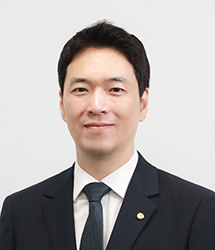
Jae Won LEE
Chief Economist and Deputy Governor
Economic Research Institute at the Bank of Korea
Jae Won LEE
Deputy Governor and Chief Economist
Bank of Korea
Jae Won Lee is the Deputy Governor and Chief Economist that directs the Economic Research Institute at the Bank of Korea. Prior to joining the Bank of Korea in 2023, he served on the faculty at Seoul National University, the University of Virginia, and Rutgers, the State University of New Jersey. Additionally, Lee was a member of committees for Korean government financial regulatory bodies, including the Financial Services Commission and the Financial Supervisory Service.
Lee's research specializes in macroeconomics, focusing primarily on monetary and fiscal policy over business cycles. His work has appeared in the American Economic Journal: Macroeconomics, American Economic Review (P&P), Economics Letters, Journal of Economic Dynamics and Control, Journal of International Economics, Journal of Monetary Economics, Journal of Money, Credit and Banking, Quantitative Economics, Review of Economic Dynamics, and the Review of Economics and Statistics. Beyond his research, Lee contributes to the academic community as a member of the editorial boards of the Journal of Macroeconomics and the Korean Economic Review, among others. He received his Ph.D. in economics from Princeton University in 2008, after obtaining a B.A. in economics and mathematics from the University of Wisconsin-Madison.

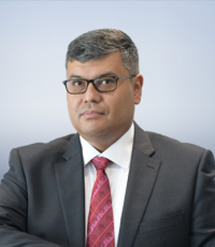
Akylzhan BAIMAGAMBETOV
Deputy Governor
National Bank of Kazakhstan
Akylzhan BAIMAGAMBETOV
Deputy Governor
National Bank of Kazakhstan
Akylzhan Baimagambetov was born on 16 August 1977 in Almaty.
Mr Baimagambetov received his degree in Finance and Banking from Abai Almaty State University, a Law degree from Al-Farabi Kazakh State University and Executive MBA degree from Nazarbayev University.
Started his career in 1998 as a leading economist in the Accounting methodology division of the NBK Accounting department and further held various positions in multiple departments of the NBK.
From 2003 to 2007 he held the position of Deputy Director of the Human resources department and Head of the Monetary operations accounting division at the NBK.
During the 2007 – 2011 period А. Baimagambetov worked at JSC Halyk Bank, where he was in charge of the retail business, operational affairs and the implementation of IT projects.
Between 2011 and 2017 А. Baimagambetov held various senior leadership positions at the National Bank of the Republic of Kazakhstan (NBK), including Advisor to the Governor of the NBK, Director of the Balance of payments and currency regulation department, as well as Director of the Monetary operations department, which is responsible for the management of NBK’s foreign exchange reserves and assets of the National Oil Fund in addition to the implementation of monetary policy.
From 2011 to 2014 he was a member of the Board of Directors at JSC Kazakhstan Stock Exchange.
А. Baimagambetov served as Chief Executive Officer and member of the Board of Directors at JSC National Investment Corporation from June 2017 to May 2019.
Chief Executive Officer of JSC Kazakhstan Deposit Insurance Fund from May 2019 to December 2019.
By the Order of the President of the Republic of Kazakhstan dated 26 December 2019, Akylzhan Baimagambetov was appointed Deputy Governor of the National Bank of the Republic of Kazakhstan.
He was awarded the «Order of Kurmet», a number of jubilee medals of the Republic of Kazakhstan, and the badge «Honored employee of the National Bank of Kazakhstan». He was also awarded the Certificate of Appreciation of the Chairman of the NBK.

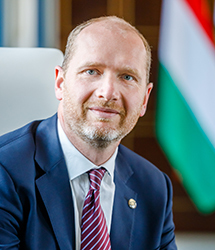
Csaba KANDRÁCS
Deputy Governor
Magyar Nemzeti Bank
Csaba KANDRÁCS
Deputy Governor
Magyar Nemzeti Bank
Mr. Kandrács was appointed as Deputy Governor of the Magyar Nemzeti Bank (the Central Bank of Hungary) in October 2019. In this capacity he is responsible for financial institutions supervision – including credit institutions, insurance and pension funds and capital markets – and consumer protection. While his responsibilities include leading the work on green finance within the central bank, Mr. Kandrács is also a member of the Presidential Committee for Sustainable Development of the Hungarian Academy of Sciences. In addition to that he also serves as a member of the Monetary and Financial Councils and Chair of the National Deposit Insurance Fund. Since 2015 he is a member of the European Banking Authority’s Board of Supervisors and from 2023 a member of the European Banking Authority’s Management Board.
Prior to his current role Mr. Kandrács served as Executive Director of the Central Bank of Hungary from 2016, where he was responsible for the supervision of financial institutions. At that time he was already a member of the Financial Stability Council. Between 2013 and 2015 he served as an outside member of the Monetary Council, then he became the Chairman and CEO of MARK Ltd., the asset management company established by the Central Bank of Hungary. Before joining to the Central Bank of Hungary, Mr. Kandrács was appointed as a Deputy State Secretary of the Hungarian State Treasury at the Ministry for National Economy in 2012 and later that year he became the President of the Hungarian State Treasury. He started his professional career as a financial expert at the Hungarian Ministry of Finance in 2003, after which Mr. Kandrács joined the Budapest 5th District Local Government in 2009 as Head of the Financial Unit.

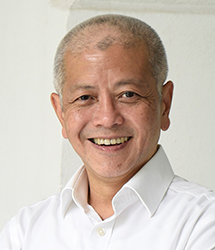
Danny QUAH
Li Ka Shing Professor in Economics and Dean, Lee Kuan Yew School of Public Policy
National University of Singapore
Danny QUAH
Li Ka Shing Professor in Economics and Dean, Lee Kuan Yew School of Public Policy
National University of Singapore
Danny Quah is Li Ka Shing Professor in Economics and Dean at the Lee Kuan Yew School of Public Policy, NUS. His work is organized around world order, economic growth and development, and inequality and income mobility. He analyses the supply and demand of international systems, analysing the preferences of Great Powers and the needs of the global community. His research on income mobility challenges conventional narratives on inequality, highlighting the broad diversity of economic experiences across nations. As Commissioner on the Spence-Stiglitz Commission and LSE’s Global Economic Governance Commission, and member of World Bank President's Economic Advisory Panel, he seeks to influence global economic transformation. Finally, he holds advisory roles with organisations like the World Economic Forum, UNDP, and a range of agencies and ministries, helping shape global economic and geopolitical discourse.
He is the author of “The Global Economy’s Shifting Centre of Gravity”.

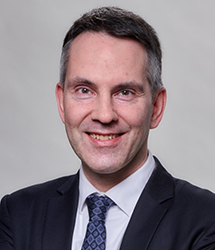
Jochen BIEDERMANN
Managing Director
World Alliance of International Financial Centers
Jochen BIEDERMANN
Managing Director
World Alliance of International Financial Centers
Since 2018, Jochen Biedermann has served as Managing Director of the World Alliance of International Financial Centers (WAIFC), an international non-profit association registered in Belgium, representing 30 leading international financial centers across five continents. WAIFC members are government agencies, associations, and similar institutions developing and promoting their financial centers. WAIFC facilitates cooperation between its members, exchanging best practices and communication with the general public.
Also, Jochen is the Managing Partner of FinTech Consult, a network of FinTech experts in Asia, Europe, and Africa supporting FinTechs in raising capital and expanding globally. He sits on the board of Eastnets, a world-leading provider of compliance, payment protection, and anti-fraud technologies. Jochen is also an expert at the Sino-German Center for Finance and Economics in Frankfurt, backed by the central banks, government institutions, and leading universities in China and Germany, a fellow of the Think Tank of the Asian Financial Cooperation Association (AFCA), based in Beijing, and a founding board member of the International Digital Economies Association (IDEA), based in Hong Kong. He is a long-standing advisor at Frankfurt Main Finance, the Frankfurt Financial Center initiative. Furthermore, he is a mentor at Cyberport in Hong Kong, OneEleven in Toronto, the Plug and Play Tech Center, the Accelerator Frankfurt, and 1000 Black Voices. Jochen sits on the board of several FinTech companies.
Finally, he is a working group member of Dubai's new DIFC Digital Economy Court. Jochen has a master's degree in mathematics & computer science from the University of Goettingen, and a Ph.D. in mathematics from the University of Cottbus, Germany. For over two decades, he has been a regular lecturer and external supervisor for the Frankfurt School of Finance & Management. He has given guest lectures at leading universities and business schools in Europe, America, and Asia.

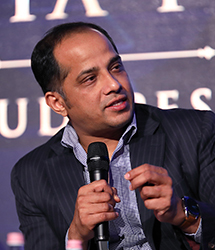
Sopnendu MOHANTY
Chief Fintech Officer
Monetary Authority of Singapore
Sopnendu MOHANTY
Chief Fintech Officer
Monetary Authority of Singapore
Sopnendu Mohanty, currently the Chief Fintech Officer at the Monetary Authority of Singapore, is responsible for creating development strategies, public infrastructure, and policies around technology-driven innovation. Mohanty has over two decades of public and private sector experience in technology, operations, digital Finance, and investment strategies.
Mohanty extensively engages with global technology and financial services ecosystems and has championed notable collaborative public goods like API Exchange (APIX), Singapore Fintech Festival, Payment Rails, Data exchange platforms, and experimental programs like Project Ubin. In addition, Mohanty advises many international global advisory bodies on Fintech, Innovation and Inclusion. Within five years of his leadership, Singapore has become a leading global Fintech hub producing unicorns and home to many vibrant fintech companies.
He has co-authored several patented works in the application of digital technology in Finance and won many industry recognitions.

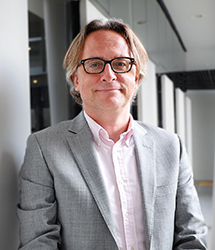
Ralf EMMERS
Professor in International Politics of East Asia Co-Chair of the Centre for International Studies and Diplomacy (CISD)
University of London
Ralf EMMERS
Professor in International Politics of East Asia Co-Chair of the Centre for International Studies and Diplomacy (CISD)
University of London
Ralf Emmers is Professor in International Politics of East Asia and Co-Chair of the Centre for International Studies and Diplomacy (CISD). His research interests cover security studies, international institutions in the Indo-Pacific, and the security and international politics of Southeast Asia. He was previously Dean of the Rajaratnam School of International Studies (RSIS) and President’s Chair in International Relations, Nanyang Technological University (NTU), Singapore.
Ralf completed his MSc and PhD in the International Relations Department of the London School of Economics (LSE). His authored books include Cooperative Security and the Balance of Power in ASEAN and the ARF (RoutledgeCurzon, 2003), Geopolitics and Maritime Territorial Disputes in East Asia (Routledge, 2010), Resource Management and Contested Territories in East Asia (Palgrave Macmillan, 2013) and Security Strategies of Middle Powers in the Asia Pacific co-written with Sarah Teo (Melbourne University Press, 2018). He is also the co-editor of the Oxford Handbook on Peaceful Change in International Relations (Oxford University Press, 2022). Ralf has contributed numerous articles in peer-reviewed journals and chapters in edited volumes. His research has been funded by the MacArthur Foundation, the Ford Foundation, the Sasakawa Foundation, and the European Union. He was a Visiting Fellow at the Australian National University, Griffith University and Warwick University.

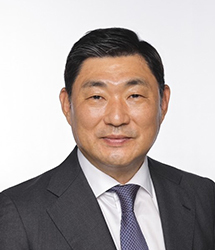
Sukhee HAN
President
Institute for National Security Strategy
Sukhee HAN
President
Institute for National Security Strategy
Han Suk-Hee is the President of the Institute for National Security Strategy (INSS) and Professor at Yonsei University. Dr. Han previously served as the Dean of Graduate School of International Studies at Yonsei University (2022-2023) and as the Consul General of the Republic of Korea in Shanghai, China (2015-2017).
He earned his Ph.D. from the Fletcher School of Law and Diplomacy at Tufts University, and his B.A. and M.A. in Political Science from Yonsei University. His main research area includes Chinese security and foreign relations, China’s power politics, U.S.-China relations, South Korea-China relations, and China-North Korea relations.

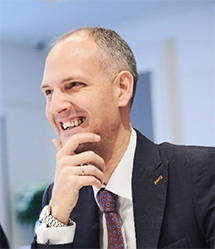
Márton UGRÓSDY
Deputy State Secretary
Head of the Office of the Prime Minister’s Political Director, Cabinet Office of the Prime Minister of Hungary
Márton UGRÓSDY
Deputy State Secretary
Head of the Office of the Prime Minister’s Political Director, Cabinet Office of the Prime Minister of Hungary
Márton Ugrósdy, PhD has been serving in the Hungarian government since June 2022. In his current role, he is responsible for preparing analytical and background briefing materials pertaining to the most recent developments of geopolitics, the internal dynamics of the European Union, as well as the activities of various key players in foreign affairs.
Before joining public service, Márton was working at the Institute for Foreign Affairs and Trade, Hungary’s eminent foreign policy think tank from 2015 till 2022. He joined the Institute as a part time research fellow, covering transatlantic relations and Central Europe with a special focus on the Visegrád Four. In 2017, he was appointed as one of the deputy directors of IFAT, and in 2018 he assumed the post of director. In these roles, he appeared frequently in the Hungarian and foreign print and broadcast media, and spoke at various events from the United States to Japan on Hungarian foreign policy.
Prior to his assignments at IFAT, Márton was the editor-in-chief of Kitekintő.hu, Hungary’s number one foreign policy news portal for seven years. During his tenure from 2009 until 2016, he oversaw the daily operations of the site, editing, proofreading and on many occasions, writing articles on different topics. During his time at Kitekintő, he led the Central Europe and Americas columns as well. Márton is a graduate of Eötvös Loránd University, with a major in political science. In addition to have served as an elected student leader, he was awarded the Republican Scholarship for academic excellence twice during his studies. After graduation, he was awarded the Hungarian-American Enterprise Fellowship Fund’s grant to work with the Center for Strategic & International Studies in Washington, DC. Later on, Márton earned his PhD from Corvinus University of Budapest in political science, with a specialization in public management. He also lectured mostly international students at Corvinus for six years in the Public Administration and Management Masters program.

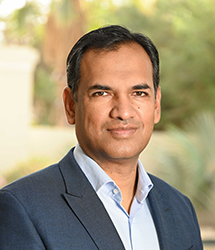
Ronit GHOSE
Managing Director and Global Head, Future of Finance
Citi Research
Ronit GHOSE
Managing Director and Global Head, Future of Finance
Citi Research
Ronit Ghose is the Global Head, Future of Finance, Citi’s think tank for the future of money and technology. Ronit’s current areas of focus include Digital Assets, the Metaverse, Web3, the applications of AI to Finance and other frontier topics. Previously, Ronit was Global Head of Banks and Fintech Research for Citi.
Ronit is an Advisor to various Governments, Universities, VC investors and tech firms in the UK, UAE and Africa. Prior to joining Citi, he worked at the British Bankers’ Association and was a research assistant in the UK Parliament for a former Prime Minister. He has an undergraduate degree from the University of Oxford & a postgraduate diploma from the University of London. Ronit is the author of the recently published FutureMoney book.

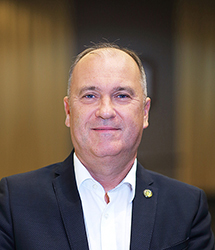
Lajos BARTHA
Executive Director
Magyar Nemzeti Bank
Lajos BARTHA
Executive Director
Magyar Nemzeti Bank
Lajos Bartha is currently Executive Director for Financial Infrastructures and Banking operations in the Magyar Nemzeti Bank, the central bank of Hungary where previously he led the Directorate Financial Infrastructures between 2007 and 2017. The executive directorate is responsible for regulation and supervision of payment services, oversight of clearing and settlement systems, and operation of the Bank’s back office including its RTGS system. It plays an active role in the development of the Hungarian payment and securities clearing and settlement infrastructures. In the last 10 years he was responsible for the introduction of the intraday clearing system in 2012, the onboarding of the HUF in the CLS settlement in 2015 and the introduction of the instant payment system in 2020.
He is the member of the ESCB’s Market Infrastructures and Payments Committee, member of the CLS Oversight Committee, Board member of the Hungarian Mint Ltd (Magyar Pénzverő Zrt). Chairman of the Supervisory board of the Hungarian Stock Exchange (BÉT Zrt) and member of the Hungarian Automated Clearing house’s (GIRO Zrt) supervisory board. He has been working for Magyar Nemzeti Bank since 1998 and has held different positions in the financial infrastructures directorate.
Before joining Magyar Nemzeti Bank, he worked for Arthur Andersen, the Hungarian State Holding Company, a commercial bank and in DG Payments Systems in the European Central Bank. He received his master’s degree in economics from the Budapest University of Economics in 1992.

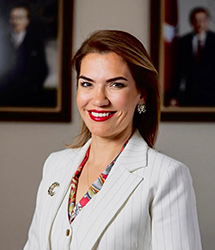
C. Gülşen KARANIS EKŞIOĞLU
Ambassador of the Republic of Türkiye
Turkish Embassy in Budapest
C. Gülşen KARANIS EKŞIOĞLU
Ambassador of the Republic of Türkiye
Turkish Embassy in Budapest
C. Gülşen Karanis Ekşioğlu spent one year with AFS scholarship in Germany during high school. She studied at University of Ankara, Faculty of Political Sciences- International Relations, graduated in 2003 and did her MBA at Bahcesehir University- Istanbul, in 2014.
Karanis Eksioglu completed Women Leadership Program at Yale University in 2019 and Digitalization Program in 2020 at MIT. Currently, she is doing her PhD at Bahcesehir University, on Global Politics and International Relations.
She has been elected as “Young Global Leader” by the “International Diplomacy Institute” in 2007. Karanis Eksioglu was Board Member of Turkish-German Business Council and also of the International Cooperation Platform. She is still member of the Board of Trustees of the Genc Hayat Foundation in Istanbul.
Karanis Eksioglu is co-coordinator of Antalya Diplomacy Forum since 2020, an initiative of Turkish Foreign Ministry.
She is married and has three children.

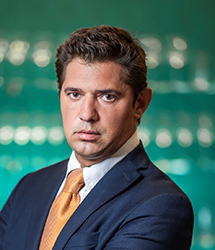
Norbert CSIZMADIA
President of the Board of Trustees - PADME
President of the Board of Trustees of the János Neumann University Foundation
Norbert CSIZMADIA
President of the Board of Trustees - PADME
President of the Board of Trustees of the János Neumann University Foundation
Norbert Csizmadia is a geographer, his field of study includes economic strategy, geostrategy, geoeconomics, and geopolitics. Former State Secretary in charge of planning coordination for the Ministry for National Economy, from March, 2013, former Executive Director of the Central Bank of Hungary. Since 2016, President of the Board of Trustees of the Pallas Athene Domus Meriti Foundation, and Chief Editor of Hungarian Geopolitics Magazine (HUG). He is member of International Advisory Board of Fudan Institute of Belt and Road & Global Governance, and independent Director Of Bank of China Hungary. President of the Board of Trustees of the János Neumann University Foundation, and President of the International Advisory Board - BC4LS (Budapest Center for Long-Term Sustainability). Co-chair of the Geopolitical Department of the Hungarian Geographical Society. Author of the book titled: Geofusion - The Power of Geography and Mapping of the 21st Century (Pabooks Publishing, LID Publishing - London, and World Scientific Publishing - Singapore) Geofusion 2.0 - Towards a long-term Sustainable Eurasian Growth, Geovision: Sustainability and Eurasia, and Geofutre – The Big Picture – Synthesis of Geopolitics and Geography (Pabooks Publishing).

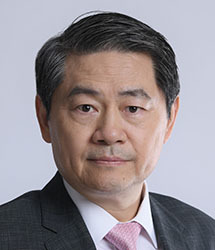
Henry Huiyao WANG
Founder & President of Center for China and Globalization
Former Counselor to China State Council
Henry Huiyao WANG
Founder & President of Center for China and Globalization
Former Counselor to China State Council
Dr. Henry Huiyao Wang is Founder and President of Center for China and Globalization (CCG), Former Counselor to China State Council appointed by Chinese Premier and Vice Chairman of China Association for International Economic Cooperation under Ministry of Commerce; Vice Chairman of China Public Relations Association; Director of Chinese People’s Institute of Foreign Affairs and China National Committee for Pacific Economic Cooperation under Ministry of Foreign Affairs; a member of Advisory Committee for Global Competence Development of Tsinghua University. In addition, he is a Steering Committee Member of Paris Peace Forum (PPF) and also sits on the Advisory Board of Duke Kunshan University and Richard Ivey Business School.
Dr. Wang pursued his PhD studies at University of Western Ontario and University of Manchester. He was a Senior Fellow at Harvard Kennedy School, a Visiting Fellow of Brookings Institute. As a thought leader on global relations, international business, global governance, talent migration, global investment, and trade, etc., he has published over 100 works; a frequent speaker at international events such as the World Economic Forum, Munich Security Conference, Paris Peace Forum; a frequent contributing writer for the op-eds to South China Morning Post, Financial Times, Bloomberg, New York Times etc.

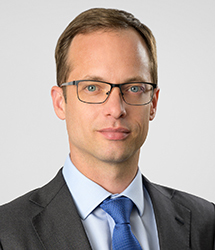
Richárd VÉGH
CEO
Budapest Stock Exchange
Richárd VÉGH
CEO
Budapest Stock Exchange
After graduating at Corvinus University of Budapest, he started to work for the Budapest Stock Exchange, where, with a 2 years’ interruption he has been working for the BSE and for almost nine years he has been a member of the Business Policy Directorate in various positions. In 2013 from the position of trading and business development director he went on to the Magyar Nemzeti Bank (MNB - Central Bank of Hungary) where he remained close to the stock market, as director of the capital market supervision. He was responsible for overseeing domestic capital market institutions, insider trading, market management investigations, and issuing capital market issuers licenses. He represented the MNB in a number of domestic and foreign organizations, including ESMA's Supervisory Board.
In 2015 he returned to the Stock Exchange, where he has been a member of the Board since December 2015 and was elected as the CEO of the BSE. From March 2017 till May 2019 he was the chairman of the BSE. The BSE strategy was worked out during his leadership aiming to develop the Hungarian capital market, to boost the supply and demand side, and to develop financial culture.
Since 2013, he has been a member of the Board of Directors of the Hungarian Investor Protection Fund (Beva) and since 2016 he has been a member of the Board of Directors of the KELER Central Depository Ltd. (KELER Zrt.) Since May 3, 2017 he has been chairman of the Sustainability Section of the Hungarian Economic Association. In December, 2018 the General Assembly of the Federation of European Securities Exchanges elected him as member of the Board.

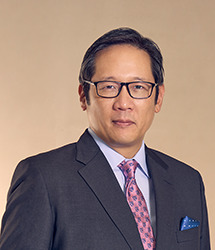
Michael SYN
President
SGX Group
Michael SYN
President
SGX Group
Mr Michael Syn is President of SGX Group. He has management responsibility for SGX’s markets and platforms across asset classes. He heads SGX’s Global Markets Division, and is CEO for SGX’s stock market, central depository and futures markets and clearinghouse.
Mr Syn serves on the board of Sentosa Development Corporation. He chairs Mount Faber Leisure Group, a leading operator of leisure and lifestyle attractions in Singapore anchored around the Singapore Cable Car Sky Network. He graduated with MA and PhD degrees from Cambridge University and attended the Harvard Advanced Management Program.

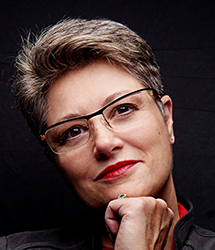
Fabienne GOUX-BAUDIMENT
CEO, proGective
Associate, Yonders
Fabienne GOUX-BAUDIMENT
CEO, proGective
Associate, Yonders
Fabienne GOUX-BAUDIMENT is a world-renowned futurist, founding head of proGective, an independent research centre dedicated to foresight since 1995, advising large companies (Carrefour, Suez) as well as public authorities (Unesco, Royal Institute for Strategic Studies). Active member of the Futures Studies community, she chaired the World Futures Studies Federation (2005-2009) and was the founding president of the French Society for Foresight (2013-2016). Adjunct professor with a PhD in Social Sciences, she held the chair of Foresight, Innovation, Entrepreneurship & Intangible Capital at Polytech Angers, France (1995-2018).
As a member of the Scientific Council of the International University of the Sea (UIM) and a member of the Board of the Foundation 2100, she is particularly involved in ocean and long-term foresight.
As a researcher, author and international speaker, she is focusing - after the "Great Transition" (2004-2017) - on the "X.0 Development Model" (2018-2028), helping organisations to develop policies capable of tackling, or even helping to solve, the major challenges of tomorrow."

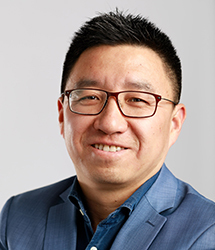
Hui ZHANG
Vice President
NIO Europe
Hui ZHANG
Vice President
NIO Europe
Hui Zhang is Vice President NIO Europe. He heads the European office (including UK) of the global electric car startup from Shanghai. After studying in Beijing, Pforzheim and Utah, Hui Zhang initially worked at VOITH AG in purchasing and supply chain management in China and Germany. Subsequent working for KIEKERT AG as Vice General Manager and Lotus as General Manager, he was responsible for Business Group Industry and Healthcare China at Leoni AG as Member of the China Board.
Due to his many years of intercultural experience, both in the German and Chinese markets, Hui Zhang has profound industry knowledge in the areas of company management, sales, purchasing and supply chain management. He now oversees NIO Europe with offices in Munich and Oxford where, in addition to design, the focus areas are Supply Chain Management and Advanced Engineering. In Addition, Hui Zhang is the Vice-President of the Chinese Chamber of Commerce in Germany.

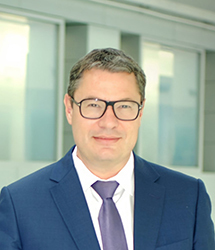
Fabrice MURTIN
Head of Research
OECD Center on Well-being, Inclusion, Sustainability and Equal Opportunities
Fabrice MURTIN
Head of Research
OECD Center on Well-being, Inclusion, Sustainability and Equal Opportunities
Fabrice Murtin is Senior Economist at the Organisation for Economic Co-operation and Development (OECD), where he is heading Research & Modelling at the OECD Centre for Well-being, Inclusion, Sustainability and Equal Opportunity.
His recent research has focused on well-being at the workplace, trust, Beyond GDP and climate change. The results of his research have been published in top academic journals such as the Journal of Economic Growth, the Review of Economics and Statistics, Economic Policy, European Economic Review or PLOS ONE. A French national, he completed his PhD at Paris School of Economics, and was a Mellon Postdoctoral Fellow at Stanford University (Centre for the Study of Poverty and Inequality) prior to joining the OECD.

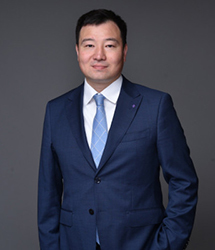
Nurkhat KUSHIMOV
Advisor of Executive Office of the AIFC
Astana International Financial Centre
Nurkhat KUSHIMOV
Advisor of Executive Office of the AIFC
Astana International Financial Centre
Mr Kushimov was appointed the Advisor of Executive Office of the AIFC on 21 October 2024.
Mr Kushimov has extensive experience in senior positions in the area of financial market regulation. Prior to this appointment, Mr Kushimov served as Chief Executive Officer at the AFSA. He started his career at the AIFC in 2018 at the Astana International Exchange (AIX), where he oversaw matters relating to the regulation of issuers and IPOs of Kazakhstan’s and international companies.
Over the years, he has held various leadership positions in the civil service, including ministries of justice and interior. A Bolashak graduate, he holds LLM degree from the University of Cambridge, Faculty of Law (2013).

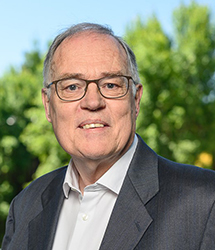
Bruno LANVIN
President
Smart City Observatory, IMD
Bruno LANVIN
President
Smart City Observatory, IMD
Bruno Lanvin is currently the President of IMD’s Smart City Observatory, and a Distinguished Fellow at INSEAD. He is the co-founder and co-author of four of the most widely used global indices on technology (Network Readiness Index), innovation (Global Innovation Index), talent (Global Talent Competitiveness Index) and Smart Cities (Smart City Index). He is also the author of the Future Readiness Economic Index Report (FREI). He is co-founder and advisor of Portulans Institute, a thinktank based in Washington DC. He is the founder and president of DL Partners, a Geneva-based consultancy, and of Descartes Institute, a think tank also based in Geneva.
During 30 years, he worked at the United Nations and at the World Bank, where he held senior positions. He currently advises governments, international organizations and multinational companies on strategic issues and the overall notion of future readiness. He is a member of several boards in different parts of the world. His recent book (The Future Is Young) was published in July 2022. His latest book (Prosperous and Inclusive Cities) came out in June 2024.
Previously, he was the Executive Director for Global Indices at INSEAD. From 2007 to 2012, he was the Executive Director of INSEAD’s eLab, managing INSEAD’s teams in Paris, Singapore and Abu Dhabi. From 2000 to 2007, Bruno Lanvin worked for the World Bank, where he was inter alia Senior Advisor for E-strategies, and Regional Coordinator (Europe and Central Asia) for ICT and e-government issues. He was also heading the Capacity Building Practice of the World Bank’s Global ICT Department, and Chairman of the Bank’s e‐Thematic Group. He has taught in a number of universities in Europe and in the United States.
Bruno Lanvin studied in France and in the USA. He holds a BA in Mathematics and Physics, an MBA (HEC), a PhD in Economics (La Sorbonne), and certificates from INSEAD (IDP-C) and MIT (Smart Cities).
A French national, and the proud father of four, he currently lives in Switzerland.

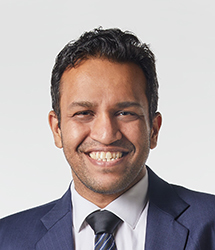
Varun MITTAL
Head of Innovation & Ecosystem, Singlife
Founder, Fintech Nation and Co-Founder, Singapore FinTech Association
Varun MITTAL
Head of Innovation & Ecosystem, Singlife
Founder, Fintech Nation and Co-Founder, Singapore FinTech Association
Varun leads Innovation and Ecosystem at homegrown financial services company, Singlife. He collaborates closely with both internal and external stakeholders to adopt transformative ideas as well as develop partnerships with key industry players. Prior to joining Singlife, Varun was responsible for FinTech business development in 130 emerging markets across the globe.
He has been involved in various technology companies throughout his career and he is co-founder of the Singapore FinTech Association and ASEAN FinTech Network. Varun is actively involved in the fintech scene, the Founder of “The Fintech Nation”, a project that seeks to support the FinTech ecosystem in Singapore, and other investment vehicles and funds, focused on early and growth stage investments in emerging markets. He holds a Master of Business Administration in Strategy and Organisation from National University of Singapore and a Bachelor of Technology in Computer Science Engineering from India.

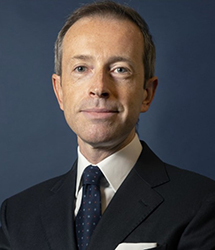
Lorenzo TAVAZZI
Senior Partner, Head of Global Intelligence and Scenarios & Head of International Development
TEHA Group
Lorenzo TAVAZZI
Senior Partner, Head of Global Intelligence and Scenarios & Head of International Development
TEHA Group
Lorenzo Tavazzi is Senior Partner and Member of the Board of The European House - Ambrosetti (TEHA) Group. He is also Head of Intelligence and Scenarios and Head for the International Development for the Group.
He works on projects involving Top Management, Strategy and Internationalization for large and multinational companies. He manages international Think Thanks and Advisory Boards and high-standing working communities involved in the issues of growth and competitiveness, including: innovation and the digital economy, infrastructure and mobility, the public sector and regulation authorities, educational and training systems, cooperation for development and international relations, and tourism.
He has in-depth expertise in advisory and policymaking activities, advocacy and public affairs. Starting in 2006, he has been working with a number of African and ASEAN countries governments in drawing up industrial and economic development strategies.
He has overseen and authored over 150 publications and studies on themes involving macro-economics, strategy and sector development.
He graduated cum laude in Banking, Financial and Insurance Economics, specializing in the Economics of institutions and financial markets. He holds a Master in Business Strategy and Management, awarded cum laude.

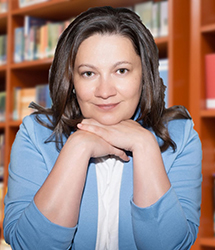
Elena ROVENSKAYA
Program Director
International Institute for Applied Systems Analysis (IIASA)
Elena ROVENSKAYA
Program Director
International Institute for Applied Systems Analysis (IIASA)
Elena Rovenskaya is Program Director of the Advancing Systems Analysis (ASA) program at the International Institute for Applied Systems Analysis (IIASA), Laxenburg, Austria. She has background in applied mathematics. Her scientific interests lie in the fields of optimization, decision sciences and mathematical modelling of complex socio-environmental systems.
As the ASA Program Director, Rovenskaya is leading a team of more than a hundred scientists who work on new systems analytical methods, which enable higher levels of agility to support policy and societal decision making. Among many other projects and activities, Elena Rovenskaya led a project on Challenges and Opportunities of Economic Integration within a Wider European and Eurasian Space (2014-2020), which focused on plausible futures of economic cooperation in the Greater Eurasian space and interplay between different integration processes in the region. More recently, she co-led an expert panel that produced policy papers for India's G20 Presidency (2023), offering recommendations to strengthen multilateralism and multilateral institutions.

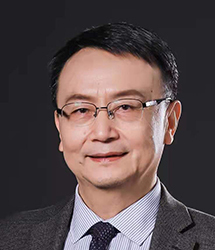
Qingguo JIA
Director, Institute for Global Cooperation and Understanding (iGCU)
Former Dean, School of International Studies, Peking University
Qingguo JIA
Director, Institute for Global Cooperation and Understanding (iGCU)
Former Dean, School of International Studies, Peking University
Jia Qingguo is professor and former Dean of the School of International Studies of Peking University. He is also Director of the Institute for Global Cooperation and Understanding and Director of Global Governance at Peking University.
He received his Ph.D. from Cornell University in 1988. He has taught in University of Vermont, Cornell University, University of California at San Diego, University of Sydney in Australia as well as Peking University. He was a research fellow at the Brookings Institution between 1985 and 1986, a visiting professor at the University of Vienna in 1997, a CNAPS fellow at the Brookings Institution between 2001 and 2002, and the Payne Distinguished Fellow for the 2022 fall quarter at Stanford.
He is a member of the Standing Committee of the 14th National Committee of the Chinese People’s Political Consultative Conference (the CPPCC). He also served as a Standing Committee member of the 11th, 12th and 13th National Committee of the CPPCC. He is Vice President of the Chinese American Studies Association, Vice President of China International Relations Studies Association, and Vice President of Chinese Japanese Studies Association. He is serving on the editorial board of more than a dozen established domestic and international academic journals on international issues.
He has published extensively on U.S.-China relations, relations between the Chinese mainland and Taiwan, Chinese foreign policy and Chinese politics.

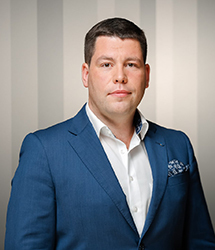
Andris BAUMANIS
CEO
UniLab
Andris BAUMANIS
CEO
UniLab
Andris Baumanis is an accomplished leader in venture capital, start-ups, and public financial management, with over a decade of experience in high-level management and early-stage investment roles. He currently serves as a Member of the Management Board at both Commercialization Reactor Fund and the science university tech accelerator, UniLab. At Commercialization Reactor, Andris oversees pre-seed to seed investment deals, fund portfolio management, and investor relations, while ensuring compliance with AML/CFT regulations. At UniLab, he serves as CEO, managing program implementation, investment strategy, and portfolio team recruitment, and leading the NATO DIANA accelerator under UniLab Defence.
Previously, Andris was the Deputy Head for Venture Capital at ALTUM, where he pioneered state-aided tech accelerators and developed next-generation seed and growth funds. He managed significant investments, including the €130 million Baltic Innovation Fund I and its €156 million successor, while spearheading international cooperation and training initiatives.
Earlier in his career, Andris held various roles at the Ministry of Finance of Latvia, leading efforts in public finance efficiency by introducing spending reviews, budget modernization, and international cooperation. His expertise in financial forecasting, budgeting, and fiscal analysis makes him a highly skilled professional across both public and private sectors.

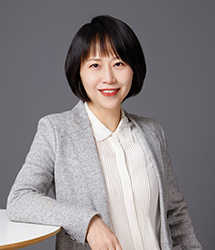
Dan WANG
Executive Vice President
Silk Road Fund Co., Ltd.
Dan WANG
Executive Vice President
Silk Road Fund Co., Ltd.
Ms. Wang Dan is Executive Vice President of the Silk Road Fund Co., Ltd. (SRF). Before joining SRF, Ms. Wang worked at the International Department and the Monetary Policy Department II of the People's Bank of China (PBOC), and her last position at PBOC was Deputy Director-General of the Monetary Policy Department II. She also served as advisor to Executive Director for China at the International Monetary Fund.
Ms. Wang holds a Master's degree in International Finance from the Graduate School of the People's Bank of China, now known as Tsinghua University PBC School of Finance.

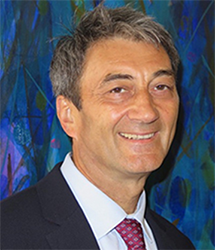
Zoltán CSÉFALVAY
Head of Centre for Next Technological Futures, School of Economics
Mathias Corvinus Collegium
Zoltán CSÉFALVAY
Head of Centre for Next Technological Futures, School of Economics
Mathias Corvinus Collegium
Prof. Dr. Zoltán Cséfalvay is head of the Centre for Next Technological Futures at Mathias Corvinus Collegium, Budapest, where he gives lectures and conducts research on the economic, social and geopolitical impacts of digitalisation, robotisation and artificial intelligence in Europe.
Previously, he worked as senior researcher at the Joint Research Centre of European Commission in Seville (2019-2020), he served as ambassador of Hungary to the OECD and UNESCO in Paris (2014-2018) and as Minister of State for Economic Strategy in Hungary (2010-2014). He was a professor of economic geography at Andrássy University Budapest (2002-2010) and has been a professor at Kodolányi János University in Hungary for more than two decades. As a research fellow he worked in Budapest, Vienna, Munich, Heidelberg, and Cardiff. Recently he has published his latest book - TECHtonic Shifts - on the current industrial revolution.

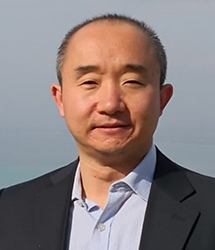
Mingjie MA
Director General
DRC Research Department of Innovation Development
Mingjie MA
Director General
DRC Research Department of Innovation Development
Dr. Ma is a research fellow and the Director General of the Research Department of Innovative Development, Development Research Centre of the State Council of China.
Dr. Ma has long been engaged in policy research on innovation-driven development strategy, innovation policy, digital transformation, green technology, and innovation. He obtained his doctorate degree in management from the Graduate School of Chinese Academy of Social Sciences. Dr. Ma was a visiting scholar at the Harvard Kennedy School.

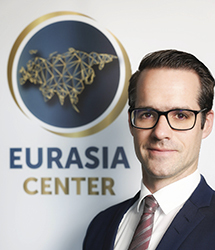
Levente HORVÁTH
Director of Eurasia Center
John von Neumann University
Levente HORVÁTH
Director of Eurasia Center
John von Neumann University
Levente Horváth is the founder and the Director of Eurasia Center of the John von Neumann University, Hungary. Levente Horváth is a China expert, has been dealing with China from 2005 onwards, he was doing his bachelor’s and master’s degree in tourism management in China, at the Fudan University in Shanghai, and graduated with rector’s award. From 2016 he is the Vice-President of the Fudan University Alumni.
Between 2017-2021, Levente Horváth was doing his PhD studies at the University of Pécs, his research field focused on the Chinese geopolitical thinking and on the One Belt, One Road initiative. Between 2015 and 2017, he was the Consul General of Hungary in Shanghai and in this position, he was responsible for deepening the Sino-Hungarian relations. In 2017-2019 he served as the Head of Educational Department in the Magyar Nemzeti Bank, the central bank of Hungary, from 2019 he became the Chief Advisor to the Governor of the central bank of Hungary. In 2021 he was given the Shanghai Silver Magnolia Award acknowledging his contribution to Shanghai’s development with respect to its economy, trade, finance, education, and culture.

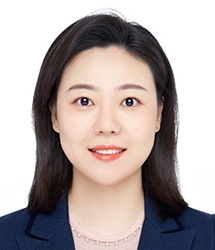
Shi PIAO
Executive Director of the Digital Economy and Green Innovation Research Center
Ant Group Research Institute
Shi PIAO
Executive Director of the Digital Economy and Green Innovation Research Center
Ant Group Research Institute
Dr. Shi Piao serves as the Executive Director of the Digital Economy and Green Innovation Research Center at Ant Group Research Institute and leads the team to explore how digital advancements and green innovations transform businesses, economies, and societies.
With rich experience in digital inclusion, platform economies and green technology, etc., Dr. Piao collaborates with global institutions and industry partners to provide valuable insights to promote green innovation and sustainable business models.
Prior to joining Ant Group in 2016, Dr. Piao worked at the International Monetary Fund in Washington, DC. She holds a Ph.D. in Macroeconomics from Seoul National University.

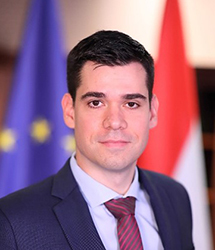
Ádám BANAI
Executive Director
Magyar Nemzeti Bank
Ádám BANAI
Executive Director
Magyar Nemzeti Bank
Ádám Banai has received his MSc from Corvinus University of Budapest. He holds a PhD in Finance from Corvinus University of Budapest. He joined the Financial Stability department of The Central Bank of Hungary in 2008. From 2013 to 2017 he was the head of Applied Research and Stress-testing Department. From mid-2017 he was the director of Financial System Analysis directorate. From 2020 he is in his current position. In his current position he is responsible for the execution of monetary policy, for financial stability and macroprudential policy, for the management of foreign reserves and for the bond purchasing program of the MNB.
He is a member of the Financial Stability Board in Hungary. He is also a member of the supervisory board at KELER CCP. He is a member of the advisory board at ESCP Europe Institute of Real Estate Finance and Management and the Royal Institute of Chartered Surveyors. His main research fields are stress testing, systemic risk, macroprudential policy, real estate market. He has several papers, articles in high level journals.

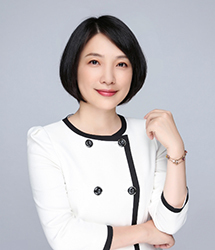
Yao WANG
Director General, International Institute of Green Finance
Deputy Secretary General, Green Finance Committee (GFC) of China Society for Finance and Banking
Yao WANG
Director General, International Institute of Green Finance
Deputy Secretary General, Green Finance Committee (GFC) of China Society for Finance and Banking
Prof. Yao Wang is the Director General of the International Institute of Green Finance at Central University of Finance and Economics. She serves as the Deputy Secretary-General of the Green Finance Committee, China Society for Finance & Banking, and an advisor to the Green Development Committee of the Securities Association of China.
Her research on the green economy and sustainable finance, is highly influential, encompassing over 300 published papers, leading more than 100 research projects, and authoring 34 monographs. Awarded the "Outstanding Contribution Award" in 2019 at the Annual China Excellent Green Finance Awards from "Asian Money".

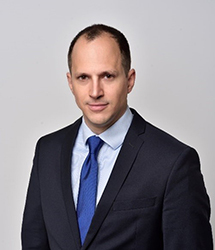
Péter FÁYKISS
Director, International Business Development
HOLD Asset Management Ltd.
Péter FÁYKISS
Director, International Business Development
HOLD Asset Management Ltd.
Péter Fáykiss is the Director of International Business Development at the HOLD Asset Management Ltd., he joined the company in 2024. Mr. Fáykiss is also active in the academic field, he is Associate Professor and Head of FinTech, AI and digitalization Institute at Budapest Metropolitan University. Before entering the digital finance area, he gained experience in financial stability, financial regulation (Basel III) and macroprudential policy. In 2014 he was appointed as the Head of Macroprudential Policy Department of the MNB, from 2017 he served as the Director of Macroprudential Directorate and from 2019 as the Director of Digitalization Directorate. Mr. Fáykiss graduated in 2009 from Corvinus University of Budapest and he holds a PhD in Finance from Corvinus University of Budapest. Mr. Fáykiss is active in the FinTech/Startup area, he participated in the MIT Regional Entrepreneurship Acceleration Program in 2022-23.

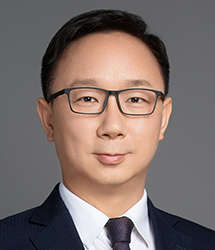
Ji ZHANG
Vice Dean, School of International Relations and Public Affairs
Fudan University
Ji ZHANG
Vice Dean, School of International Relations and Public Affairs
Fudan University
Ji ZHANG is Vice Dean and Professor at School of International Relations and Public Affairs of Fudan University. He is also Director of Center for People-to-People Exchange Studies, Director of Center for French Studies at Fudan University. He is the expert of the Ministry of Education “The Advanced Study Program for People-To-People Exchange”, Vice Chair of Chinese Association for French Studies, Vice Chair of Shanghai Association for International Studies. He is serving on the editorial board of several academic journals including Etudes Françaises and etc.
His research interests include diplomacy studies, European studies, Chinese Foreign Policy, French Foreign Policy, and People-to-People Exchange. He is the author of Sino-French Relations under Profound Changes Unseen in A Century (2020), Two-way Dynamics of Europeanization: France and the Common Security and Defence Policy of the European Union (2014), and editor-in-chief of International Leadership: Competition and Sharing of Power (2020) and Book Series on People-to-People Exchange Studies(2018, 2019, 2021). He was a visiting scholar at Sciences Po. Paris in 2008-2009. He was invited to participate the Paris Peace Forum (1st edition), the EU-China ( 2nd, 3rd, 4th round), UK-China (4th round) High Level People-to-People Dialogue and the U.S.-China High level Consultation on People-to-People Exchange (7th round).

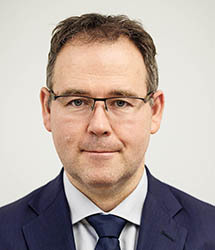
Zsolt KUTI
Executive Director
Magyar Nemzeti Bank
Zsolt KUTI
Executive Director
Magyar Nemzeti Bank
Mr Zsolt Kuti is Executive Director for Monetary Policy, Financial and Competitiveness Analysis in the central bank of Hungary since 2021. He and his team have an essential role in supporting the decision-making of the monetary policy strategy, analysing the latest financial market, macro-financing and competitiveness developments of the Hungarian economy.
He completed his studies at the Budapest University of Economics and Public Administration and the University of Otago in New Zealand. He received his master's degree from the Central European University. He started his career at Citibank in 2001. He joined the central bank of Hungary in 2008 as a senior analyst in the Financial Analysis Department. In 2014 Mr. Kuti became the Director of Monetary Policy and Financial Analysis Directorate. In 2021 he was appointed Executive Director responsible for Monetary Policy, Financial and Competitiveness Analysis. Since 2023 he is the Chief Economist of the Magyar Nemzeti Bank.
He also researched at the Basel-based Bank for International Settlements during his career. In addition, he has been a member of the Board of Directors of the Budapest Stock Exchange since 2014 and a member of the Board of Directors of KELER Central Depository Ltd. since 2020.

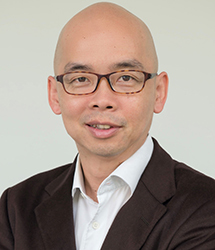
David TOH
Chief Executive Officer
NTUitive
David TOH
Chief Executive Officer
NTUitive
David Toh is Director and CEO of NTUitive, a wholly owned subsidiary of the Nanyang Technological University of Singapore responsible for commercialising the university’s scientific research and incubating startups.
Before joining NTUitive in 2013, David spent 20 years in the finance industry at ING Barings, Lehman Brothers and DBS Asset Management as a top rated technology sector analyst and fund manager. In that capacity, David also advised listed and private technology companies in the Asia Pacific region on corporate strategy and fund raising in capital markets. After leaving investment banking, David worked as a fund manager at DBS Asset Management before setting up his own Asia Pacific focused equity investment fund.
Prior to the finance industry, David worked as a process engineer at Chartered Semiconductor, where he was responsible for fab wide yield enhancement activities. David is a member of the Singapore Stock Exchange Listings Advisory Committee, and is also an independent director of SGX-listed iFast Corp. David graduated with double degrees from Cornell University in 1991 with distinctions in B.Sc. in Materials Science & Engineering and a B.A. in Government and Asian Studies.

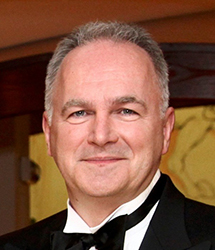
László SZABÓ
Founder and Head
Hungarian Innovation Hub
László SZABÓ
Founder and Head
Hungarian Innovation Hub
Dr. László Szabó obtained his medical degree from the University of Debrecen in 1990 and subsequently worked as a transplant surgeon in Debrecen. He continued his career at the American pharmaceutical company, Eli Lilly and Company, where he engaged in sales, marketing, HR, research and development, and leadership across seven countries on four continents over 18 years.
Between 2010 and 2014, he served as the CEO of Teva Hungary in Budapest. For three years, he was Hungary's ambassador to the Unites States, preceded by three years as the Deputy Minister of Foreign Affairs and Trade. From 2020 to 2022, he held the position of CEO at Mediaworks Zrt. In his most recent role, as the founder and head of the Hungarian Innovation Hub, he is responsible for the development of a comprehensive ecosystem spanning multiple universities.

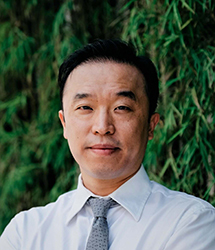
Yongwook RYU
Assistant Professor, Lee Kuan Yew School of Public Policy
National University of Singapore
Yongwook RYU
Assistant Professor, Lee Kuan Yew School of Public Policy
National University of Singapore
Dr. Yongwook RYU is a professor of international politics at Lee Kuan Yew School of Public Policy, National University of Singapore. His areas of expertise cover the foreign policies of China, Japan, Korea and ASEAN as well as broad regional and global issues.
His current research projects examine the US-China tech competition, supply chains, maritime security, Sino-Japanese relations, and the concept of hedging in IR. A native of South Korea, Dr. Ryu grew up both in Korea and New Zealand, and speaks Korean, Japanese, and Chinese (Mandarin). Prior to joining the NUS, he taught at the Australian National University and Yonsei University. Dr. Ryu received his Ph.D. from the Department of Government, Harvard University, where he was a Frank Knox Memorial Fellow.

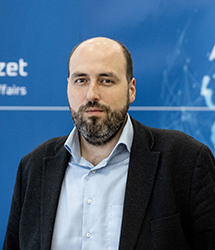
Tamás BARANYI
Director for Strategy
Hungarian Institute of International Affairs
Tamás BARANYI
Director for Strategy
Hungarian Institute of International Affairs
From February 2020 he is Deputy Director for Strategy at the Institute for Foreign Affairs and Trade. From 2023 he is the Director for Strategy of the Hungarian Institute of International Affairs (HIIA). From 2015 to 2020 he was Head of Research of the Antall József Knowledge Centre. From 2019 he is Adjunct Professor at Pázmány Péter Catholic University. From 2013 to 2019 he was external lecturer at the same department. From 2011 he has worked at the House of Terror Museum as a historian, then, from 2012 to 2015 as Head of Research. He defended his PhD thesis in 2018 at the Department of Modern and Contemporary History at Eötvös Loránd University about the changing elbow-room of Hungarian foreign policy during the era of détente. His research area are the history of the United States and the Cold War, foreign political strategy, and transatlantic relations. Baranyi Tamás has received his MA degree in History and American Studies at Eötvös Loránd University of Budapest in 2010.

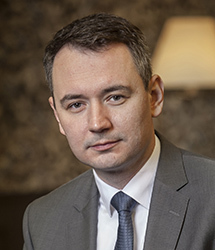
András BALATONI
Director
Magyar Nemzeti Bank
András BALATONI
Director
Magyar Nemzeti Bank
András Balatoni was graduated at the University of Pécs Faculty of Business and Economics. He participated in the Massachusetts Institute of Technology’s Regional Entrepreneurship Acceleration Program between 2021 and 2023. András started his professional carrier at the ECOSTAT Governmental Institute for Strategic Research as an analyst in 2007. Thereafter he joined Századvég Economic Research Ltd. in 2010 as a senior analyst, in June 2011 he became research director. He worked as a senior macroeconomic analyst at the ING Bank’s Hungary Branch between 2013 and 2016. Currently he is the director of the Directorate Economic forecast and analysis at the National Bank of Hungary, the member of the Board of directors at the Hungarian Mint Ltd., member of the presidium, Economic Policy and Economic Theory Section of the Hungarian Economic Association, the macroeconomic editor of the Hungarian Economic Review, member of the Advisory Board of the University of Pécs Faculty of Business and Economics, where he is also an Executive Fellow. His main research areas include cyclical patterns of the economies, the macroeconomics of convergence, innovation, and entrepreneurship.

TOP QUOTES FROM THE BUDAPEST EURASIA FORUM 2023
Knowledge is the single, most important resource, it is a base for a win-win-win-win new world order. Mutual respect, appreciation of knowledge and the essence of knowledge will be instrumental to the final shape of the new world order.
Györgyi Matolcsy
Governor, MNB
I believe that our geopolitical conditions are suitable for us to become a gateway of Asia in Europe.
Mihály Varga
Minister of Finance, Hungary
Peace and development are the worlds' two permanent objectives. We all know that without peace there will be no development, without development peace will not last long.
Hongbo Wu
Special Representative of the Chinese Government on European Affairs
Achieving sustainable development requires strengthening of investment cooperation on science, technology and innovation.
Xuejun Cai
President (CEO), Silk Road Fund
My basic recommendation is multipularity, mutual respect, keeping lines of communication open, and understanding that an interconnected world is a better world for everybody.
Jeffrey Sachs
Director, Center for Sustainable Development, Columbia University
For the sustainability and the net zero tagets to be achieved we need newer/more talent. We need more people with more passion to come out and build something and then we need an environment.
Nameer Khan
Chairman, MENA Fintech Association
There is a convergence of skills, network, capability happening between the various geographies.
Shadab Taiyabi
President, Singapore FinTech Association
It has to make economic sense for the change to be truly sustainable.
Kamran Khan
Head of ESG for Asia Pacific, Deutsche Bank
Precisely, we need all the major players working together, and countries like Hungary […] can really connect everybody.
Wang Huiyao
Founder and President, Center for China and Globalization (CCG)
The new technological innovations are coming from cooperation and competition, but there is gonna be no winners coming from fragmentation.
Cyn-Young Park
Director for Regional Cooperation and Integration Department, Asian Development Bank
We are hearing about cooperation, about using available technology and about sharing our experience to try to make the world a better one. So make the world a better one!
Bernard Yeung
Emeritus President, Asian Bureau of Finance and Economic Research
Great power competition, derisking and decoupling are totally against the interests of our country [Hungary], the [Central and Eastern European] region, and […] even Europe.
Márton Schőberl
Chief Executive Officer, Hungarian Institute of International Affairs
We need to trust more younger people, we need to involve more women in our decision making and third and most important […], we need to replace fears with hopes. If we don't belive in our futureit's not going to be the one we like.
Bruno Lanvin
President, Smart City Observatory
We overuse the word teaching when we are talking about education, it's not about teaching it's about learning.
Sir John O'Reilly
President, Khalifa University of Science and Technology
Countries that have been successful, have not been successful because they did one single thing in one policy area that's so different from everyone else, but they were able to coherently develop strategies that combine different types of policy instruments in an effective way.
Christian Ketels
Principal Associate, Harvard Business School
Sustainability can be the force, the big push that pushes us toward a higher-level equilibrium.
Chong-En Bai Dean
School of Economics and Management, Tsinghua University
A fairly balanced and opened and frank dialogue of competition and collaboration […] is a very vise way to meet the challenges and […] unlock the potential of the opportunities that we have together.
Lorenzo Tavazzi
Partner and Responsible for the International Department, The European House Ambrosetti
We are not just talking abstract concepts anymore, but actual results we need on the ground […] as ESG gets targeted around real-world impacts then, we have the chance to make real difference in this world.
Benjamin Cashore
Professor, Director, Institute of Environment and Sustainability, Lee Kuan Yew School of Public Policy, National University of Singapore
We have to change the mindset on the fight against climate change from burden-sharing to opportunity-sharing.
Raekwon Chung
Board Director, Ban Ki-moon Foundation for a Better Future
In the future everyone can be the transmitter and receiver of the knowledge.
Renhe Zhang
Vice President, Fudan University
There will be a need for continuous upskilling and reskilling in order for humans to be able to interact and leverage technology and to advance technology in a right way.
Ayham Fayyoumi
Education & Skills Director, PwC Middle East, Education & Skills Practice
The 4 C's - creativity, collaboration, communication and critical thinking - have been talked about a lot as the future competencies that need to be focused more, but in the same time in order to talk about sustainable future in the term of peace and prosperity obviously we need additional C's that I personally believe are compassion and commitment.
Paul Kim
Chief Technology Officer & Associate Dean, Stanford Graduate School of Education
AI should be used extensively for the benefit of the world and for the benefit of our ecosystem.
Deepak Ohri
Founder & CEO, lebua Hotels and Resorts
This website uses cookies to provide a more convenient browsing experience. By using this website, you accept the use of cookies. Please read our Cookie Guidelines, for more information on cookies, including information on how to disable or delete them.I accept
Please be informed that our Data Protection Guidelines were changed to be compliant with data protection laws.I understand
